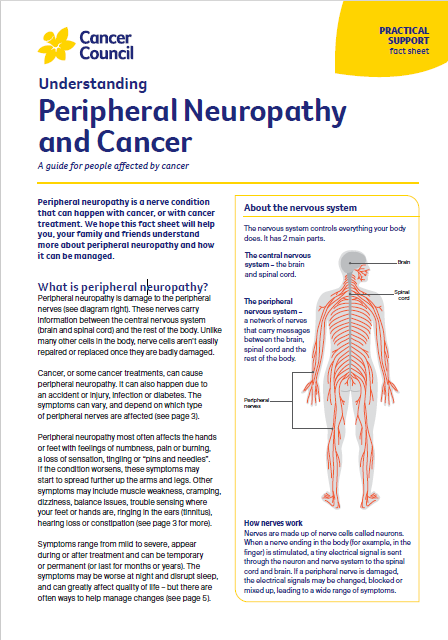- Home
- About Cancer
- Managing side effects
- Peripheral neuropathy
- Managing symptoms
Managing symptoms
Discover effective ways to manage peripheral neuropathy symptoms. Learn about different medications and treatments that can provide relief.
Learn more about:
Medicines to manage symptoms
Doctors use various medicines to help relieve symptoms including:
| pain medicines | you can try over-the-counter pain medicines (e.g. paracetamol, ibuprofen) but these may not be helpful; your doctor may prescribe stronger pain medicines (e.g. tramadol), but the side effects may mean that these are not good long-term solutions. |
| duloxetine | sometimes this antidepressant is recommended for managing peripheral neuropathy; while some studies have shown that it helps relieve numbness, tingling and pain, other studies have found no benefit. |
| other drugs | because treatment options are limited, some other types of antidepressants, the anticonvulsant pregabalin, and the topical creams capsaicin or lignocaine are sometimes recommended by doctors to relieve symptoms such as pain, but how well they work is not clear. |
| laxatives or stool softeners | these can help manage constipation. |
You may see a range of health professionals to help manage peripheral neuropathy symptoms, including a psychologist (or sometimes a pain specialist), exercise physiologist, occupational therapist, physiotherapist or podiatrist.
Learn more about managing cancer-related pain and listen to our podcast on pain and cancer.
Ways to manage peripheral neuropathy
Try these tips to help relieve symptoms, reduce the risk of injury and adapt to life with peripheral neuropathy.
ExerciseStudies suggest that in people having chemotherapy, those who do some exercise have a lower risk of developing nerve damage. Gentle, regular exercise can also help reduce the symptoms of peripheral neuropathy pain. A daily gentle walk is a good starting point. Continuing to exercise after you finish treatment may also lower your risk of post-treatment peripheral neuropathy. A physiotherapist, exercise physiologist or occupational therapist can create a suitable exercise plan that’s personalised for your situation. Learn more about exercising during and after cancer treatment. |
|
Avoiding falls
An occupational therapist suggests aids or equipment (e.g. special shoes) or strategies (e.g. using visual cues on uneven ground) to help you with daily tasks and to reduce your risk of falls. They may gradually introduce different textures to encourage normal use of your hands. A physiotherapist or exercise physiologist may help you to improve your strength and balance, and may also suggest walking aids. |
|
Caring for hands and feet
A podiatrist can trim your toenails, treat any skin problems (e.g. blisters and corns), and check your feet for signs of any injuries that you may not have noticed. |
|
Preventing dizziness
|
|
 |
Managing constipation
|
Coping with pain and other challengesLearning relaxation or meditation may help you manage pain and discomfort. A psychologist can teach you these techniques, or try our relaxation and meditation podcast. Some people find massage helps nerve pain, but check with your doctor first. TENS (transcutaneous electrical nerve stimulation) devices which send small electrical currents to parts of the body, and certain dietary supplements, are in clinical trials to see if they help. A counsellor or psychologist can help with the challenges caused by your diagnosis. |
|
Talking about your sex lifeTalk to your doctor about issues with erections, vaginal dryness or loss of libido as there may be medicines that can help. |
The impact of peripheral neuropathy
This varies from person to person, but can include:
- discomfort and pain from physical symptoms
- trouble completing usual tasks (e.g. doing up buttons)
- high risk of burns and cuts due to numbness, which can increase the risk of infection during chemotherapy
- risk of not noticing injuries, which may become more serious because they aren’t treated promptly
- high risk of falls and difficulty walking due to numbness or pain in your feet or feeling off-balance
- constipation and lack of bowel or bladder control
- poor sleep because of shooting pains
- not being able to drive because of symptoms
- feeling isolated or that you have lost your independence
- not being able to return to work or usual activities
- money issues because of health care costs.
Call Cancer Council 13 11 20 for help with these impacts.
Podcast: Managing Cancer Pain
Listen to more episodes from our podcast for people affected by cancer
Podcast: Meditation and Relaxation
Listen to more of our meditation and relaxation podcast for people affected by cancer
More resources
Dr Fiona Day, Senior Staff Specialist Medical Oncologist, Calvary Mater Newcastle, NSW; James Chirgwin, Senior Physiotherapist – Oncology, Haematology and Palliative Care, The Wesley Hospital, QLD; Kim Kerin-Ayres, Nurse Practitioner Cancer Survivorship, Sydney Cancer Survivorship Centre, Concord Hospital, NSW; Melanie Moore, Lead Exercise Physiology Clinical Supervisor, UC Cancer Wellness Clinic, University of Canberra, ACT; Olivia Palac, Acting Assistant Director, Occupational Therapy, Gold Coast University Hospital, QLD; Danielle Rippin, Consumer; Dr Jane Wheatley, Clinical and Health Psychologist, Department of Pain Medicine, St Vincent’s Health Network, Sydney, NSW.
View the Cancer Council NSW editorial policy.
View all publications or call 13 11 20 for free printed copies.

